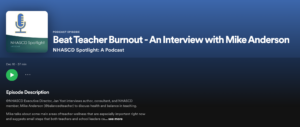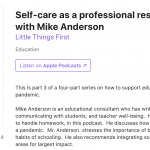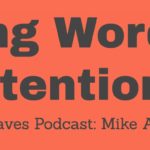Ask the Author: Mike Anderson
| Margaret Wilson: I know that your own struggle with staying balanced and healthy as a teacher inspired you to write The Well-Balanced Teacher. I can certainly relate to that struggle! Do you think there’s something about teaching that makes it particularly tough for teachers to lead well-balanced lives?
Mike Anderson: I think that we, as teachers, pour our hearts and souls into our work, because we love to help others. As a general rule, teachers care immensely about their students and colleagues, and that caring takes an incredible wellspring of physical and emotional energy. We need to learn to take care Of course, teachers aren’t the only ones out there who struggle with balance and stress. Some business professionals are famous for pulling late hours at the office and never turning off their cell phones. Police officers and firefighters have incredible work-related stress. Many doctors are on call through weekends and holidays. But I do think there are some aspects of teaching that make it stressful in a distinctive way, and so I wrote the book to share strategies for staying healthy and balanced in this profession. Margaret Wilson: Besides drawing on your personal experience, what kind of research did you do for this book? Mike Anderson: My most important source of information was teachers themselves—I talked with hundreds of teachers all over the country about their struggles with staying energized and balanced. I also dug into the professional literature. I read a lot of books and articles on a range of topics that all helped inform my thinking. Margaret Wilson: Did your discussions with teachers confirm your own experience? Did they lead to any surprises or new discoveries? Mike Anderson: Actually, both happened. Talking with other teachers, I found that just about everyone struggles with balance in some form or other, which confirmed what I suspected. But what was surprising for me was the variety of sources of stress and disequilibrium experienced by teachers. For some, finding an exercise routine and eating healthfully at school is the greatest challenge. For others, finding positive collegial connections is the main struggle. Other teachers find it difficult to manage their time and the amount of work they have to do. I decided that the book needed to address all of these issues and more. Margaret Wilson: I was struck by the fact that you go beyond the typical recommendations about spending more time on one’s personal life. You also encourage teachers to make better professional choices and to hold onto their passion for teaching, and you offer advice on ways they can do that. Why do you think this aspect of self-care is so important for teachers? Mike Anderson: Finding more time for personal endeavors is important, but we run the risk of disengaging from teaching if we focus all our energy on how to get away. It’s vital to look for ways to keep yourself energized about your work. For example, one year I took myself off a scheduling committee (which I didn’t have much positive energy for) and signed up for a committee about improving our adult community (which I had tons of positive energy for). I actually spent more time in committee work after the switch, but I enjoyed it a lot more. Margaret Wilson: In my work with teachers recently, I’ve been hearing a lot about stress related to dealing with email, cell phones, and other technologies that blur the line between work and home. Do you have any advice on that issue? Mike Anderson: The ability to take a call or answer email almost anytime, anywhere, is one of the great blessings and curses of the last ten years in teaching. If we don’t set some boundaries, it’s easy to let things get out of hand. When I was a classroom teacher, the policy I used was to welcome work-related phone calls only during certain hours (5:00–7:00 pm). Being clear about when it was okay to call made it okay that I didn’t take school calls at other times. I think it’s a good idea to set work-free zones for yourself each day and each weekend. These need to be guilt-free chunks of time when you disengage from work (including email!) completely so that when you pick up again, you feel rested and recharged. Margaret Wilson: One of my favorite parts of The Well- Mike Anderson: It started because every spring I got frustrated when I realized that I didn’t have enough time left to cover all the content I was supposed to teach. The year I kept track was one when, just before school started, teachers were given guidelines for how much time should be spent on various subjects per day (sixty minutes for reading workshop, sixty minutes for math, forty-five minutes for writing workshop, etc.). I added them up and thought they seemed unrealistic, especially considering that many of the things we do in school weren’t accounted for: assemblies, field trips, fire drills, announcements . . . So I started keeping careful track of how much time my students and I really had to cover the required content. I kept a simple log on the computer, and every time other school activities cut into time that had been allocated to instruction, I noted it. I also logged instructional time lost to snow days. At the end of the year, the results were striking! I discovered that I really didn’t have enough time to teach all that I was supposed to. That discovery was liberating for me. It allowed me to let go of thinking it was my fault that I wasn’t getting everything in and to give myself permission to make decisions about what my students most needed. Margaret Wilson: Speaking of not having enough time, one source of some minor professional stress for me is the stack of great books I’ve collected that I can’t seem to find time to read. So what are your thoughts about why a pressed-for-time teacher should move your book to the top of her pile? Mike Anderson: I shared the first draft of this book with a colleague, and she made the same point: “Mike, it’s a great idea, but I’m not sure an overworked teacher is going to take the time to read a book about it!” As I revised, I worked hard to make this book practical and concise—my hope is that teachers can take something useful away from every page! In the book, I cover what I think are the most critical areas for maintaining equilibrium in our lives as teachers: our basic needs (such as food and sleep); positive connections with others; feeling significant and appreciated; maintaining positive engagement with our work; and keeping a balance between our personal and professional lives. Important stuff! But I also tried hard to keep it light and easy to read and to include lots of real-life examples. When it comes down to it, I believe all teachers want to do what’s best for their students. Becoming more well-balanced ourselves will enable us to have the dedication, emotional reserves, and positive energy that our students need us to have.
Original Link: https://www.responsiveclassroom.org/article/ask-author-mike-anderson |




